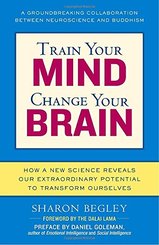|
Maturing and learning don’t stop at 18, whether you’re on the autism spectrum or not. As any parent of a college age student can attest, there’s a great deal of maturing that takes place after high school. As we move through adulthood, that continues to be true. I think this continued development is especially true for those with autism and Asperger’s. Neuroplasticity, the ability of the brain to reorganize and restructure itself both physically and functionally, is now known to be possible at any age. Although young brains seem to be the most capable of gross reorganization, a growing body of research is showing that the brain continues to be plastic throughout life. An informative, as well as entertaining and very readable, discussion of neuroplasticity and new discoveries surrounding the topic is presented in Train Your Mind, Change Your Brain, by Sharon Begley. Begley, a science writer for Newsweek, and before that, the Wall Street Journal, presents some of the new research and discoveries about neuroscience. The data is presented against the backdrop of Dharamsala, India and the 2004 Mind and Life meeting between Western researchers and the Dalai Lama. Begley explains numerous examples of how animal and human brains are impacted and changed, both in function and structurally, through our experiences, sensations and even thoughts. The idea of a primate generating new neurons is interesting, but what does it mean in practical terms? Plenty. Right about the time I was reading Begley’s book, the 10th anniversary issue of Autism Asperger’s Digest (November/December 2009) came out. The entire issue is available online, and there are a number of interesting stories from individuals looking at their progress over the years. The one that most elegantly illustrates this idea of lifetime neuroplasticity is Temple Grandin’s The Way I See It column, "Learning Never Stops". Grandin talks about how she and others on the autism spectrum continue to learn how to communicate, behave, and expand their minds, not just as children, but throughout their lives.
When I work with young adults and college students with autism and Asperger’s, I’m continually reminded of this concept. I think parents sometimes worry that their high school age children aren’t on track for transitioning to adult independence. Certainly, in some cases, that’s true, but so often, these young adults are continuing to make rapid advances in their social skills, executive functioning and emotional management. Kids who aren’t ready for a job or college right after high school can continue to mature and learn and be ready a few years later. As Grandin and Begley both illustrate so clearly, the key to this growth is continued exposure to new experiences, new challenges and the opportunity to keep learning. Comments are closed.
|
Patricia Robinson MFT
I'm a licensed therapist in Danville, California and a coach for Asperger's and ADHD nationwide. I work with individuals of all ages who have special needs, like Autism Spectrum Disorders, ADD, ADHD, and the family members and partners of special needs individuals. Archives
February 2015
Categories
All
|


 RSS Feed
RSS Feed